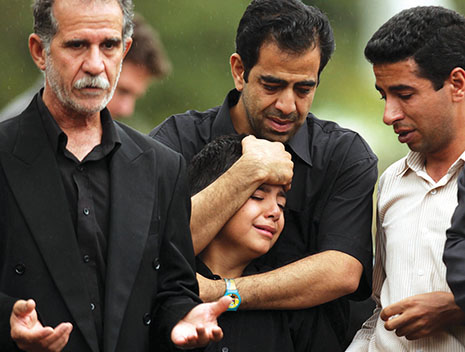IN OCTOBER 2009 prime minister Kevin Rudd took over control of Australia’s asylum seeker policy from his immigration minister, Chris Evans, and decreed that the Oceanic Viking should not be allowed to offload its human cargo of Sri Lankan asylum seekers in Australia. Since then, the Labor government’s response to the arrival of “boat people” has been a shambles. To make matters worse for the government, the Coalition’s immigration spokesperson, Scott Morrison, has hardly put a foot wrong. The one significant exception happened in February last year.
Three months earlier, in December 2010, a boat carrying asylum seekers lost engine power, struck rocks just off Christmas Island, and crashed in heavy seas against the island’s cliff face. At least thirty of the passengers – and perhaps many more – died. Two months later, twelve of the victims were buried in Sydney, where they had relatives. The Australian Federal Police footed the bill for the funerals and the federal government paid for close relatives who had survived the disaster and were still in detention on Christmas Island to attend. That’s when Morrison made a serious error of judgement, questioning why the funerals weren’t held on Christmas Island. He told the ABC’s Barbara Miller, “If relatives of those who were involved wanted to go to Christmas Island, like any other Australian who wanted to attend a funeral service in another part of the country, they would have made their own arrangements to be there.” He also called on the government “to understand the value of taxpayers’ dollars in this area.”
On the face of it, these were innocuous comments. But many of those who heard them also saw footage of the first three funerals: of two babies and of a man from Iran, whose orphaned nine-year-old son, Seena Aqhlaqi Sheikhdost, had been flown in from Christmas Island. Seena’s mother and brother had also perished but their bodies had not been recovered. His closest relative in Australia was now a cousin living in Sydney. The television news reported Morrison’s remarks and showed images of the distraught boy. The shadow minister was lambasted not only by refugee advocates but also by a senior member of the shadow cabinet, Joe Hockey: “No matter what the colour of your skin, the nature of your faith, if your child has died or a father has died, you want to be there to say goodbye, and I totally understand the importance of this to those families.” Within a day, Morrison had to admit that the timing of his remarks was “insensitive” and “inappropriate.” While he stopped short of apologising for the comments themselves, he said, in a rare show of self-criticism by an Australian politician, “I had to show a little more compassion than I showed yesterday. I am happy to admit that.”
Morrison’s faux pas and his subsequent contrition would have given the government a chance to score much-needed points – if not for a similar error of judgement by his counterpart, immigration minister Chris Bowen. The minister insisted not only that nine-year-old Seena should remain in detention but also that he should be flown back to Christmas Island after the funeral rather than being allowed to stay with his cousin in Sydney. In a remarkably emotional interview, Melbourne radio host Jon Faine pleaded with the minister to release the boy: “It’s the easiest of cases you’ll ever get. He should be with his family, minister.” Bowen was unmoved, missing the opportunity to highlight Morrison’s lack of compassion. But he relented soon afterwards and, within days of having returned to Christmas Island, Seena was released and reunited with his Sydney relatives.
Maybe Morrison and Bowen should have known better. Ten years earlier, the visible suffering of another young Iranian immigration detainee, Shayan Badraie, also elicited a strong emotional response from the Australian public. Footage depicting Shayan, filmed with a camera smuggled into the Villawood detention centre, was broadcast on ABC TV’s Four Corners. The immigration minister at the time, Philip Ruddock, misread the public’s mood when he tried to blame the parents for the boy’s suffering. The arrival of the Tampa soon shifted the debate; but the “children overboard” lies, which featured so prominently in the last days of the 2001 federal election campaign, could be seen as the government’s belated response to the public relations debacle over Shayan’s detention.
Jon Faine opened his interview with Chris Bowen with a revealing choice of words: “To the politics second, and the compassion first.” The consensus of the Labor government and the Liberal–National opposition – that asylum seekers pose a threat to the integrity of Australia’s borders or to its social fabric, that fear of asylum seekers is legitimate, and that a policy of deterrence is an appropriate response – has been questioned effectively in only two respects: by the courts’ occasional insistence that measures of deterrence must not violate Australian law, and by the public’s occasional show of compassion for individual asylum seekers, particularly children. Another potentially effective response, rational argument, has had very little impact. Who really cares that Australia has to deal with only a tiny fraction of the world’s irregular migrants, that deterrence can’t be a substitute for a long-term solution involving other countries in the region, or that Australia has the capacity to accommodate a much bigger share of refugees in need of resettlement? By contrast, who doesn’t care about young Shayan and young Seena? It seems as if only compassion can trump politics.
Politics and compassion can hardly be separated, of course. In fact, what we have witnessed over the past fifteen or so years is the rise of a politics of compassion: a politics that refers to compassion (rather than, say, rights) for its justification and draws on the language of compassion, and which increasingly informs policy-making. In Australia, it was Kevin Rudd who began championing a greater role for compassion. Two years before he became prime minister, he nominated compassion as one of five values “which might underpin a vision for the nation’s future” (the others were security, competition, fairness and sustainability). As prime minister, he frequently invoked the language of compassion when promoting government policies.
AMONG the handful of scholars who are analysing the growing traction of the politics of compassion is the French anthropologist Didier Fassin. As he writes in his new book, Humanitarian Reason: A Moral History of the Present, “The distinctive feature of contemporary societies is without doubt the way that moral sentiments have become generalised as a frame of reference in political life.” What makes Fassin’s work particularly interesting is the fact that his explanations of how and why people today “often prefer to speak about suffering and compassion than about interests or justice, legitimising actions by declaring themselves to be humanitarian” are based on ethnographic fieldwork and what is usually referred to as discourse analysis. As he writes, “we must ask to what extent the words used contribute to forming (and transforming or even deforming) the objects that constitute the world, and… we must examine the way actors take hold of words to manipulate them.”
One of Fassin’s “fields” is the bureaucracy responsible for regularising the status of illegal immigrants in France. In one of his chapters, he analyses the work of public medical officers in the département of Seine-Saint-Denis in the Île-de-France, northeast of Paris. He charts the shift from the “immigrant” (the source of much-needed labour) to the “foreigner” (whose presence is perceived as an imposition and who is of no immediate use to the French economy). In the 1990s, the state increasingly clamped down on the sans papiers, France’s undocumented migrants. But at the same time, new legislation gave authorities the option of using a “humanitarian reason” when deciding whether a sans papiers would be deported or granted a visa. If they deemed that a foreigner had a serious illness that couldn’t be treated adequately in his or her country of origin, medical officers could recommend that the département’s prefect issue a residence permit. As a result of the new laws, the foreigner’s body has become as much of an asset as the immigrant’s, because it can arouse the compassion that compels the bureaucrat to make a favourable decision.
The fight against AIDS in South Africa is another of Fassin’s case studies. He shows how the death in 2001 of twelve-year-old Nkosi Johnson, who had opened the thirteenth international AIDS conference in Durban the previous year, transformed the debate about AIDS. In Fassin’s words, Johnson’s death “signalled the entry of the theme of childhood” into public discussion of the disease. Subsequently, AIDS campaigners focused on children who were HIV-positive and on AIDS orphans. Fassin shows how their reification as victims removed children “from the social reality in which they lived” by neglecting the historical and social contexts of their situation, and how the mobilisation of compassion for their suffering tended to detract attention from other AIDS victims. Yet representing innocent children as the prime victims of AIDS, faced by an indifferent society and a government in denial, also allowed campaigners to compel the South African authorities and international aid agencies into action.
Did the ends justify the means? In Fassin’s view, “this emotional mobilisation is fragile and ambiguous.” The sentiments aroused by images of abused, dying or abandoned children are fickle. The orphan who deserves compassion can quickly morph into the threatening criminal youth living on the streets.
As Fassin shows, the rise of a politics and a rhetoric of compassion has contradictory consequences. Compassion is the symptom of an unequal relationship between victims and spectators who have the option of becoming good samaritans. In Australia’s case, it is the relationship between the asylum seeker and the person extending compassion as a citizen of a prosperous, peaceful and democratic country. As Fassin observes, “Humanitarian reason governs precarious lives.” By neither questioning inequality nor exposing its root causes, compassion enshrines this inequality. And often compassion’s main benefit is to make the compassionate person feel good about being able to indulge in seemingly unselfish sentiments.
But compassion can also gesture towards, and maybe prompt, a politics of solidarity. “In contemporary societies, where inequalities have reached an unprecedented level, humanitarianism elicits the fantasy of a global moral community that may still be viable and the expectation that solidarity may have redeeming powers,” Fassin writes. “This secular imaginary of communion and redemption implies a sudden awareness of the fundamentally unequal human condition and an ethical necessity to not remain passive about it in the name of solidarity – however ephemeral this awareness is, and whatever limited impact this necessity has.” What if compassion has become the most realistic means of generating such awareness? After all, images of Seena and of Shayan shifted, however fleetingly, public opinion in ways no rational argument could.
The insight that political issues are increasingly read in moral terms and that compassion has the capacity to trump politics makes the kind of critique performed by Didier Fassin all the more important. There is nothing wrong with feeling compassionate towards a suffering child, of course, particularly if the arousal of compassion is then channelled towards changing the policies that make such suffering possible in the first place. But that is neither to say that compassion on its own is the most appropriate response, nor to condone its implications. Studies like this, empirically grounded, theoretically informed and open to surprises born of relentless curiosity, demonstrate the value of scholarship that is truly critical – even if it’s critical of something as “morally untouchable” as the humanitarian reason dissected in Fassin’s book. •




